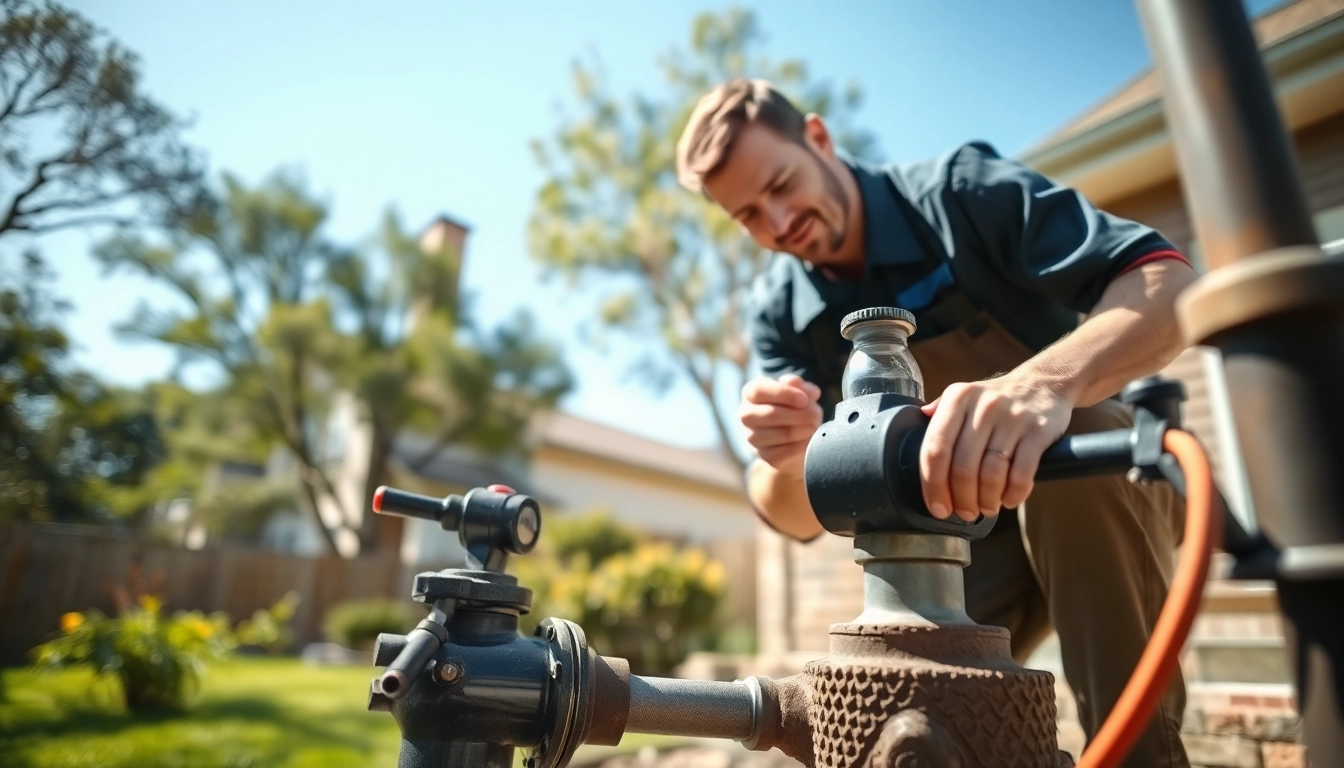Understanding Well Pump Replacement in Lacey, WA
Residents and businesses in Lacey, WA, depend on well water systems as vital sources for their everyday water needs. Proper maintenance and timely replacement of well pumps can prevent water shortages and costly damages. This guide provides a comprehensive overview of well pump replacement lacey wa, ensuring a deep understanding of the processes involved, selection of the right pumps, and the importance of professional services.
What is a Well Pump and Its Importance?
A well pump is a crucial component that transports groundwater from beneath the earth’s surface into homes and businesses. Essentially, it moves water from the aquifer to the surface, making it accessible for various uses, including drinking, irrigation, and household chores. The pump’s reliability directly impacts the quality of life, making it essential for residents to understand its function and maintenance.
Signs You Need Well Pump Replacement in Lacey, WA
Detecting the need for well pump replacement early can save both time and money. Common signs include:
- Low Water Pressure: A noticeable drop in water pressure could indicate pump failure or other underlying issues.
- Strange Noises: Unusual sounds, like grinding or humming, signal that the pump is working overtime or experiencing mechanical failure.
- Color Changes in Water: Water that appears discolored may indicate a malfunction in the pump or changes in the well itself.
- Frequent Cycling: A pump that turns on and off frequently may not be able to maintain the required water flow, requiring inspection and potentially replacement.
- Age of the Pump: If your well pump is over 10-15 years old and experiencing issues, it may be more economical to replace it entirely.
Benefits of Professional Well Pump Services
Engaging professional services for well pump replacement offers several benefits:
- Expert Evaluation: Professionals can assess the condition of both the pump and the well, providing insights into potential issues that may not be visible to the untrained eye.
- Quality Installation: Proper installation ensures optimal performance and longevity, reducing future maintenance needs.
- Time Efficiency: Trained experts can complete the replacement in a fraction of the time it would take an inexperienced individual.
- Warranty Protection: Many professional services offer warranties on both the pump and workmanship, providing peace of mind for your investment.
Choosing the Right Well Pump for Your Needs
Selecting the appropriate well pump is essential for ensuring reliable water supply. Understanding the types available and various factors influencing the selection process can greatly impact performance and longevity.
Types of Well Pumps Available in Lacey
Two main types of well pumps are commonly used in Lacey:
- Submersible Pumps: These pumps are installed underwater and push water to the surface. They are efficient and typically long-lasting, making them ideal for deeper wells.
- Jet Pumps: Installed above the ground, jet pumps are suitable for shallow wells. They draw water up using suction and are usually easier to maintain than submersible pumps.
Factors to Consider for Well Pump Selection
Selecting the right pump involves numerous considerations:
- Depth of the Well: The deeper the well, the more powerful your pump needs to be.
- Water Usage: Consider your household or business’s water requirements, as this will influence the flow rate needed from the pump.
- Energy Efficiency: Opt for pumps with good energy ratings to save on electricity costs and environmental impact.
- Local Regulations: Certain regions have guidelines regarding the types of pumps that can be installed. It’s crucial to ensure compliance.
- Budget: While cost shouldn’t always dictate decision-making, setting a budget helps narrow down options without sacrificing quality.
Cost Considerations for Well Pump Replacement Lacey WA
The cost for well pump replacement can vary greatly depending on several factors:
- Type of Pump: Submersible pumps generally cost more than jet pumps due to installation complexity and their higher efficiency.
- Installation Labor: Hiring licensed professionals may involve higher upfront costs but could prevent future issues.
- Additional Components: New piping, fittings, and electrical work may also add to total expenses.
- Permits and Inspections: Local regulations may require permits, which can affect the overall cost.
The Well Pump Replacement Process
The process of replacing a well pump requires careful planning and execution to ensure optimal results.
Steps Involved in Replacing a Well Pump
Generally, the steps for well pump replacement include:
- Assessment: A professional evaluates the existing system to determine the best replacement options.
- Water Flow Measurement: Testing is performed to ascertain the necessary flow rate for your needs.
- Choosing the Right Pump: Based on evaluations and user needs, an appropriate pump is selected.
- Preparation: Proper safety measures and drainage must be arranged before installation.
- Removal of the Old Pump: The existing pump, including pipes, wires, and connections, is carefully removed.
- Installing the New Pump: The new pump is installed as per manufacturer’s specifications, with secure fittings and connections.
- Testing: After installation, the system is tested to ensure functionality and efficiency.
Tools and Equipment Needed for Installation
Replacing a well pump requires specific tools, including:
- Wrenches
- Pipe cutters
- Cable connectors
- Suction hoses
- Voltage tester
- Pump hoist (for submersible pumps)
- PVC or stainless steel piping (depending on your specific pump requirements)
Common Challenges During Well Pump Replacement
Some challenges that may arise include:
- Unexpected Damage: Existing pipes or electrical connections may be damaged when removing the old pump.
- Well Depth Issues: Pumps located deep underground may require special equipment for retrieval.
- Weather Conditions: Inclement weather can inhibit the installation process, necessitating delays.
Maintenance Tips for Well Pumps
Maintaining your well pump is crucial for ensuring it operates efficiently and lasts long. Regular maintenance can help mitigate unexpected failures and costs.
Regular Maintenance Practices
Key practices include:
- Visual Inspections: Regularly check for leaks, cracks, or corrosion.
- Testing Water Quality: Monitor for changes in water quality and have it tested annually.
- Keeping Records: Document maintenance work and water quality checks to identify trends over time.
How to Extend the Lifespan of Your Well Pump
To prolong the life of your pump:
- Install a Water Softener: This can minimize mineral buildup that reduces efficiency.
- Monitor Electrical Supply: Ensure that the electrical supply and connections are stable to avoid pump strain.
- Regular Professional Inspections: Scheduling professional inspections at least once a year can catch small problems before they escalate.
When to Schedule Professional Inspections
It is advisable to seek professional inspection in the following circumstances:
- Prior to a significant change in water usage requirements (like installing a sprinkler system).
- If unusual noises or pressures are noted.
- Periodically (at least once a year) as part of an overall maintenance strategy.
Finding Reliable Service Providers in Lacey, WA
Selecting a trustworthy service provider is key to ensuring a successful well pump replacement.
Qualities to Look for in a Well Pump Service Expert
When evaluating potential service providers, consider:
- Experience: Look for professionals with adequate experience in well systems.
- Licensing and Insurance: Ensure that the service provider is fully licensed and insured to avoid liability issues.
- Positive Reviews: Check online customer reviews for feedback on their service and reliability.
- After-Service Support: Opt for companies offering guarantees or warranties on their installations.
How to Get Quotes for Well Pump Replacement
Getting accurate quotes involves:
- Requesting detailed assessments to understand the specific needs and costs involved.
- Comparing multiple quotes to ensure a competitive price and understanding included services.
- Asking about any hidden fees to avoid surprises in your total expenditures.
Customer Review Insights for Local Services
When evaluating potential services, consider the following:
- Overall Satisfaction: Focus on reviews that indicate customer satisfaction regarding both service and product quality.
- Response Time: Good providers often receive praise for their prompt response times.
- Overall Cost: Look for insights on whether customers feel they received good value for money.




